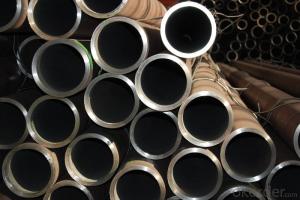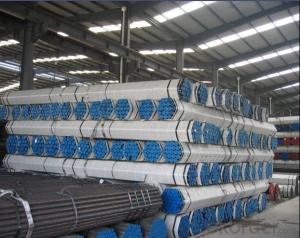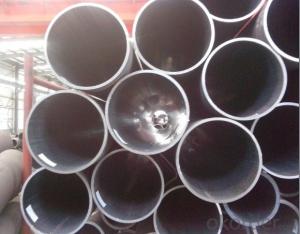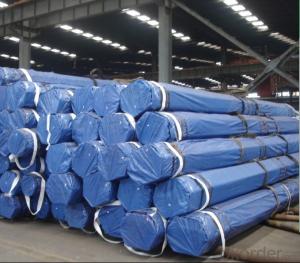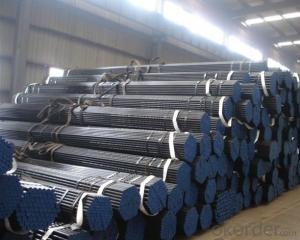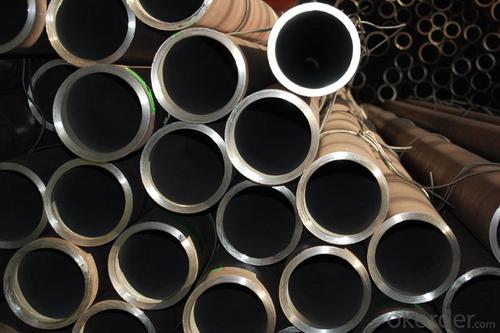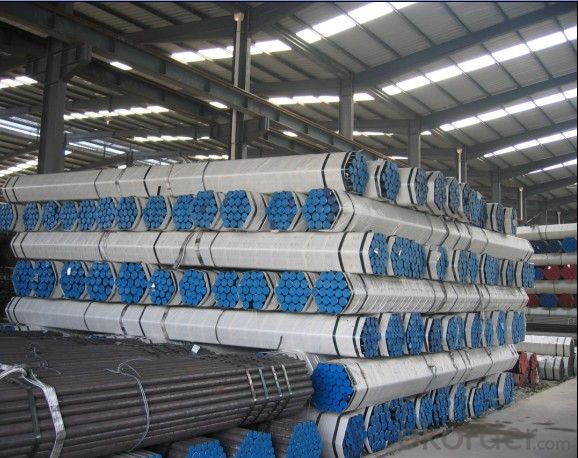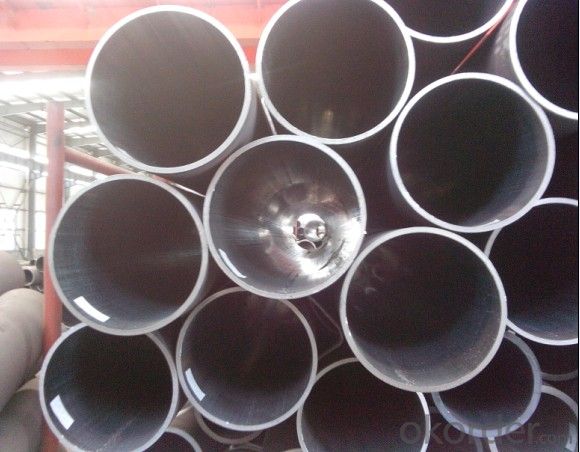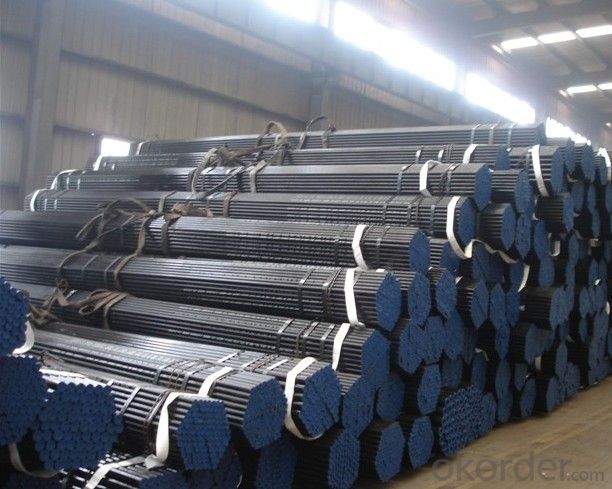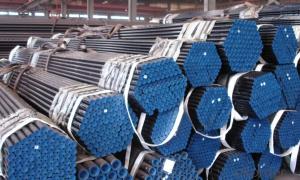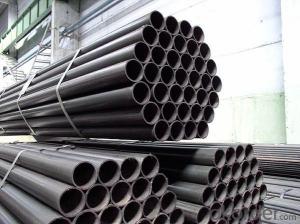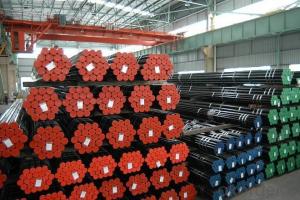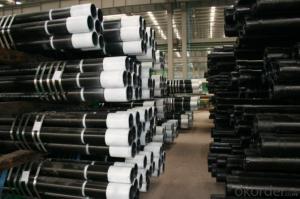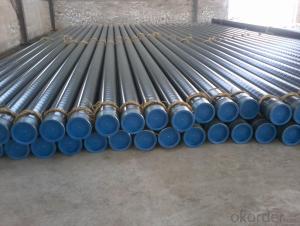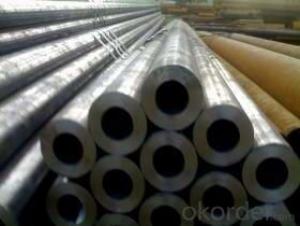Seamless Steel Pipe SCH40 / SCH80 / STD
- Loading Port:
- Tianjin
- Payment Terms:
- TT or LC
- Min Order Qty:
- 100 m.t.
- Supply Capability:
- 1000 m.t./month
OKorder Service Pledge
OKorder Financial Service
You Might Also Like
Commodity: Prime Seamless Steel Pipe
Standard: ASTM A106/A53, GB/T 8163
Material: ASTM A106/A53 Gr B, 20, Q345 etc
Tolerance: OD +1%/-1% WT +12.5%/-10%
Size: OD: 60mm-325mm, can be manufactured by customer's requirement; WT: 2.5mm-60mm; Length: 5.8M~12M, length can be manufactured by customer requirement.
Bundling: according to the customer's requirements
Packing: standard Seaworthy Packing (NB: Coating against rust)
Protection: supply varnish coating, bevel end, plastic cap
Size details as below:
1.Material:20#(ASTM A 106/A53 GRB.API5LGRB,GB),45#,16Mn,10#.
2.Specification range:OD:21.3-610mm,WT:6-70mm,length:6-12m or according to the requirement of clients.
3.Excutive standards:GB,ASME API5L.ASTM A 106/A53,Despite of the above standards,we can also supply seamless steel pipe with standard of DIN,JIS,and so on,and also develop new products according to the requirements of our clients!
4.Surface:black lacquered,varnish coating or galvanized.
5.Ends:Beveled or square cut,plastic capped,painted.
6.Packing:bundles wrapped with strong steel strip,seaworthy packing.
Packaging & Delivery
Packaging Details: | seaworthy package,bundles wrapped with strong steel strip |
Delivery Detail: | 15-30days after received 30%TT |
Seamless Steel Tubes Image
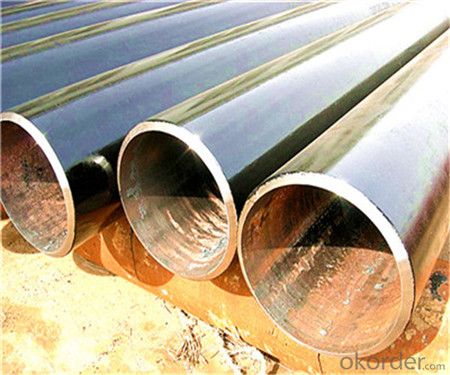
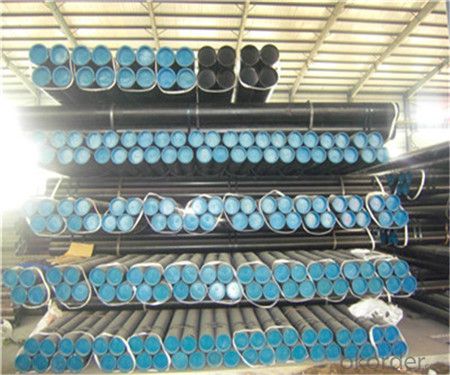
FAQ of Seamless Tube
①How is the quality of your products?
Our products are manufactured strictly according to national and internaional standard. If products’ quality don’t accord to discription as we give or the promise before you place order, we promise 100% refund.
②How about price?
We are factory and be able to give you lowest price below market one, and we have a policy that “ for saving time and absolutely honest business attitude, we quote as lowest as possible for any customer, and discount can be given according to quantity”.
③Why should you chose us?
Chose happens because of quality, then price, We can give you both.Additionally, we can also offer professional products inquiry, products knowledge train(for agents), smooth goods delivery, exellent customer solution proposals.Our service formula: good quality+good price+good service=customer’s trust
SGS test is available, customer inspection before shipping is welcome, third party inspection is no problem.
If you have any question, pls feel free to contact us !
- Q: What is the difference between carbon steel pipes and stainless steel pipes?
- The main difference between carbon steel pipes and stainless steel pipes lies in their composition. Carbon steel pipes are primarily made of iron and carbon, while stainless steel pipes contain iron, carbon, and a minimum of 10.5% chromium. This chromium content in stainless steel pipes creates a protective layer of chromium oxide on the surface, making them highly resistant to corrosion. On the other hand, carbon steel pipes are more susceptible to corrosion and require additional coatings or treatments to prevent rusting. Additionally, stainless steel pipes offer better heat resistance and can withstand higher temperatures compared to carbon steel pipes.
- Q: What is the purpose of a steel pipe coating?
- The purpose of a steel pipe coating is to provide a protective layer that prevents corrosion and extends the lifespan of the pipe. It also enhances the pipe's resistance to various environmental factors and improves its overall performance.
- Q: ASME seamless tube how to express, what is the form, I did not find on the ASME, thank God!
- You can refer to the ASME B31.10, such as the requirements for the SA106GRB seamless steel tube outer diameter of 168.3 x 7.11, specifications can be marked as NPS6 SCH40 SMLS, the real mark should include pressure steel pipe factory name or trademark, and the material level, specifications, standards, wall number, batch number, pressure test (if any), NDE detection (if any)
- Q: How do steel pipes handle chemical exposure?
- Steel pipes are generally known for their excellent resistance to chemical exposure. The high strength and durability of steel make it a reliable material for handling various chemicals. Steel pipes can withstand exposure to a wide range of corrosive substances such as acids, alkalis, solvents, and gases without experiencing significant degradation or damage. One of the main reasons steel pipes handle chemical exposure well is due to their inherent corrosion resistance. Steel is naturally resistant to corrosion and can form a protective oxide layer on its surface, which acts as a barrier against chemical attack. Additionally, steel pipes can be coated or lined with corrosion-resistant materials such as epoxy, polyethylene, or cement to provide extra protection against aggressive chemicals. Moreover, steel pipes are commonly used in industrial applications where they come into contact with different types of chemicals. They are extensively used in chemical plants, refineries, water treatment facilities, and other industries where chemical transportation or storage is required. Steel pipes can handle the high pressures and temperatures associated with these processes while maintaining their structural integrity and chemical resistance. However, it is important to note that the resistance of steel pipes to chemical exposure can vary depending on the specific type and concentration of the chemical. Some highly corrosive substances may require additional measures such as specialized coatings or alloys to ensure long-term protection. In summary, steel pipes are generally well-suited for handling chemical exposure due to their inherent corrosion resistance, durability, and versatility. Their ability to withstand a wide range of corrosive substances makes them a reliable choice for various industrial applications involving chemical transportation and storage.
- Q: Can steel pipes be used for underground culverts?
- Yes, steel pipes can be used for underground culverts. Steel pipes are known for their strength, durability, and resistance to various environmental factors, which makes them suitable for underground applications. They can withstand heavy loads, high water pressure, and the corrosive effects of soil and water. Additionally, steel pipes are available in various sizes and thicknesses, allowing for customization to fit specific project requirements. However, it is important to consider factors such as the soil conditions, water table levels, and potential for corrosion when selecting the appropriate type of steel and protective coatings for the pipes.
- Q: Are steel pipes suitable for use in chemical plants?
- Yes, steel pipes are suitable for use in chemical plants. Steel pipes offer excellent resistance to corrosion, high durability, and can withstand high temperatures and pressures commonly found in chemical processing. Additionally, steel pipes can be easily welded, making them versatile for various chemical applications.
- Q: How are steel pipes used in the manufacturing of pressure vessels?
- Steel pipes are commonly used in the manufacturing of pressure vessels as they provide the necessary strength and durability to withstand high internal pressure. These pipes are welded or seamless and are often used as the main structural component of the vessel. They allow for the efficient flow of fluids or gases within the vessel and provide a reliable and secure containment system for various industrial applications.
- Q: Can steel pipes be used for sewage disposal systems?
- Yes, steel pipes can be used for sewage disposal systems. Steel pipes are durable, resistant to corrosion, and have high strength, making them suitable for conveying sewage and wastewater. Additionally, steel pipes can handle high-pressure systems and are often used in industrial and commercial applications for sewage disposal.
- Q: Are steel pipes suitable for underground cable protection?
- Yes, steel pipes are suitable for underground cable protection. Steel pipes provide excellent durability and strength, making them ideal for protecting cables from external factors such as physical damage, moisture, and corrosion. They are able to withstand the weight of the soil and any potential pressure from above, ensuring the cables remain secure and protected. Additionally, steel pipes can be easily welded or connected to create a continuous and seamless conduit, further enhancing their effectiveness in underground cable protection.
- Q: Can steel pipes be used for wastewater treatment facilities?
- Yes, steel pipes can be used for wastewater treatment facilities. Steel pipes are known for their durability, corrosion resistance, and high strength, which makes them suitable for handling various types of wastewater and harsh chemicals. Additionally, steel pipes can be easily welded, allowing for flexibility in design and installation.
Send your message to us
Seamless Steel Pipe SCH40 / SCH80 / STD
- Loading Port:
- Tianjin
- Payment Terms:
- TT or LC
- Min Order Qty:
- 100 m.t.
- Supply Capability:
- 1000 m.t./month
OKorder Service Pledge
OKorder Financial Service
Similar products
Hot products
Hot Searches
Related keywords
